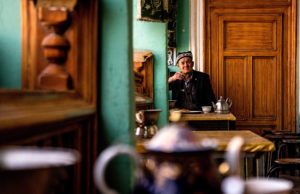Absence of Religion Is Not the Impetus behind China’s Human Rights Abuses
 A man sits in a cafe in Urumqi, the capital of the Xinjiang Uyghur Autonomous Region of China (Photo by simon sun on Unsplash)
A man sits in a cafe in Urumqi, the capital of the Xinjiang Uyghur Autonomous Region of China (Photo by simon sun on Unsplash) The human rights abuses perpetrated by the Chinese government against their ethnic Muslim Uyghur minority have been gaining significant media attention. With a population of fifteen million Uyghurs, the Xinjiang Uyghur Autonomous Region is located in the remote northwest of the country and makes up about one-sixth of China in area, making it a perfect place to conduct human rights violations virtually undetected.
Since the Chinese government’s invasion of the Xinjiang Uyghur Autonomous Region in 1949, Chinese Communist Party (CCP) leadership have oppressed the Uyghur people and tried to Sinicize the region. This abominable process has included building over native land, importing Han Chinese workers into the province, and, more recently, detaining and imprisoning Uyghurs and dissenters in “reeducation” camps.
The government incentivizes Han Chinese to move west and take control of province leadership, promising them a lower cost of living and job opportunities. Chinese oil and gas companies force Uyghurs off their native land, ordering the communities to abandon their traditional nomadic, herding lifestyles so the government can build train tracks, drill for oil and gas, and mine precious metals, perpetuating this ethnic cleansing even further and irreparably destroying the natural environment. Security checkpoints manned by People’s Liberation Army soldiers in full riot gear are set up across cities, on buses, and at every entrance to train stations and airports. Voice recognition software and fingerprint and iris scanners are used for surveillance of all citizens at all times. Han Chinese government officials are even sent to live with Uyghur families the government views as dangerous or insurgent, spying on and analyzing the most intimate details of their lives. The Chinese government has instituted a “public health” campaign in the region, which requires blood samples from every member of the Uyghur population. What the government hasn’t told the people is that this collection is, in fact, optional and the CCP will use their DNA database to further monitor the ethnic minority.
In addition to surveillance, the government aims to wipe out all religious and cultural expression of this Central Asian people, who have inhabited the area for over four-thousand years. Speaking a traditionally Muslim, Turkic, and Arabic-sounding language, the Uyghur people resemble Central Asians and Arabs much more than Han Chinese. Uyghurs in Xinjiang are not allowed to publicly practice their religion nor culture; Uyghur men cannot wear beards, while women’s headscarves and long skirts are banned. Worshiping in mosques is out of the question, and the Uyghur language is banned from being taught in schools. Instead, Uyghur children must swear allegiance to the Communist Party and express their loyalty to Xi Jinping.
As these abuses have ramped up in both scale and intensity in recent months, the United States has finally begun to take notice (helped along by the fact that US companies sell this surveillance technology to the Chinese government). The Congressional-Executive Committee on China (CEEC) held a hearing last Thursday, July 26, entitled “Surveillance, Suppression, and Mass Detention: Xinjiang’s Human Rights Crisis” to address the issue. Witnesses and United Nations experts testified to the horrors of these “reeducation” camps, to which Uyghurs are taken for a myriad of so-called “insubordinations,” including being labeled “untrustworthy” and being suspected of thinking treasonous thoughts about the party or Xi Jinping. In these camps, prisoners are starved, tortured, and killed unless they publicly renounce Islam and pledge their allegiance to the Chinese Community Party.
After learning about the abuses at these camps, Senator Marco Rubio (R-FL), chair of the committee, not only condemned American companies for selling technology to the Chinese government to be used to perpetuate these abuses, he also vehemently denounced the inhumanity and the ideology of the Chinese Communist Party. Ambassador Kelley E. Currie, US representative on the Economic and Social Council of the United Nations stated that “the party is an atheist entity,” corroborating Rubio’s more subtle allegations. Rubio and other participants at the hearing painted a black and white picture of democracy vs. communism, and ethical religious values vs amoral atheism.
Abuses against the Uyghur people and attempts to quash an ancient tradition of Islamic religious expression are despicable. But the Chinese government’s state-mandated atheism is not the reason behind this immorality. Instead, the CCP has replaced religion with allegiance to Xi and adherence to the party line. Lack of belief in a higher power, as the hearing’s witnesses implied, does not automatically strip a person of their moral compass. These human rights violations should be appalling to anyone who learns about them, and especially to humanists, who lead a lifestyle motivated by compassion that affirms the dignity of each human being. The atheism of a people is not the problem here. Greed and an innate determination to hold absolute control over all citizens powered these atrocities. As humanists who support the maximization of individual liberty and stand for human rights and justice, we must advocate for the Uyghur people and their right to practice whatever religion and culture they subscribe to, showing that leading an ethical life is irrelevant to a belief in a god.
